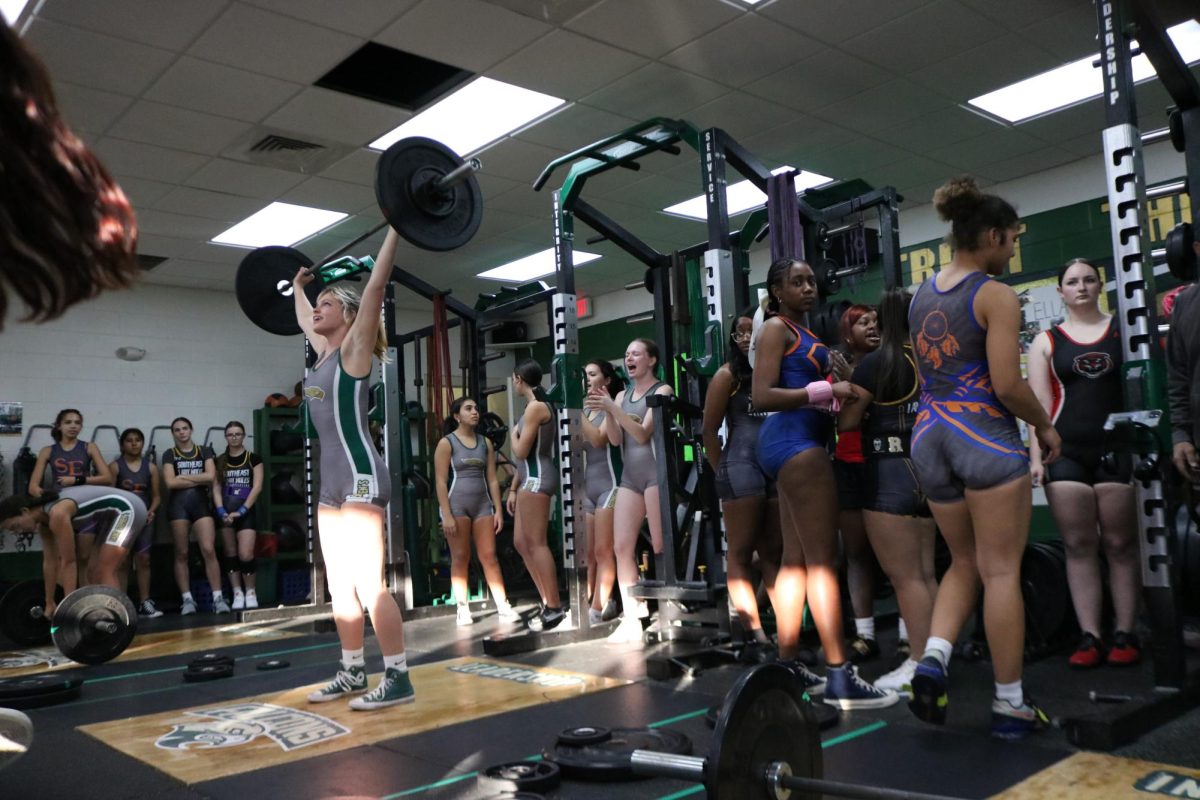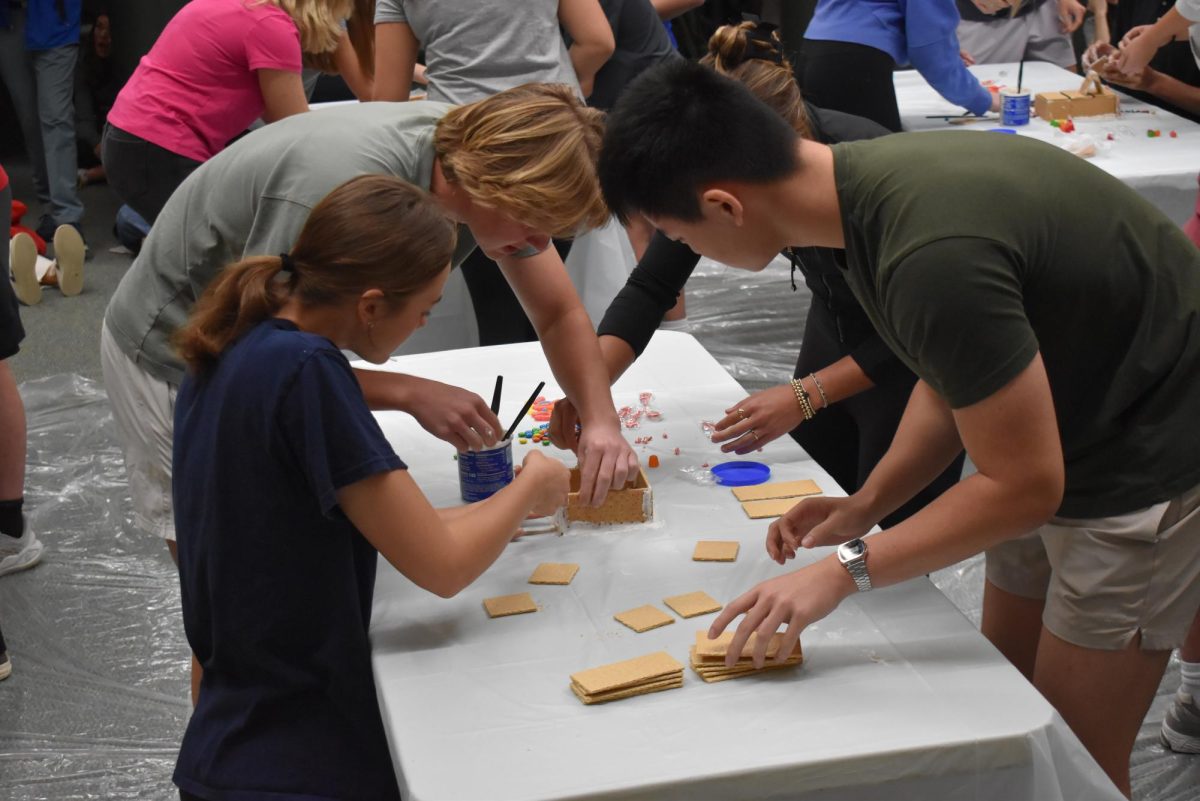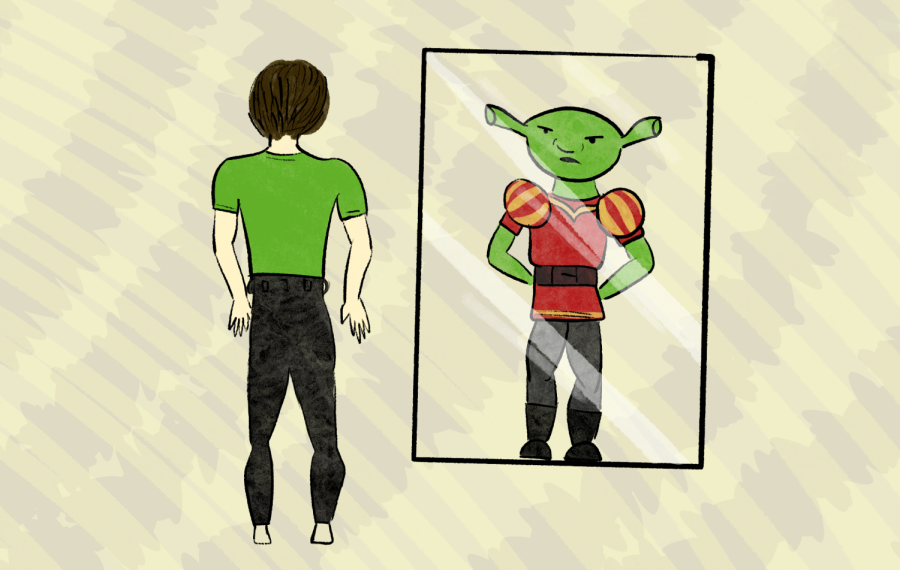Creature of Comparison
Comparing yourself to others can deeply affect your own mental health. Instead of defaulting to comparison, learn to appreciate individuality.
The mirror’s reflection of me vs how I truly appear
March 16, 2022
I go to the Urban Outfitters at UTC mall. I try on a green, patterned sweater and look in the mirror, suddenly my love for the garment diminishes. I see myself standing in the mirror, looking twenty pounds heavier and two shades paler. Upon looking at the model who was wearing the same outfit, instantly I want to rip the clothes off my body. The model was wearing the same sweater, in the same size, but they look amazing and well– I look like Shrek’s doppelganger trying to wear Lord Farquaad’s clothes.
These kinds of negative thoughts have become a virus in our society. Personally, I can’t remember the last time I was out in public and didn’t think, “Wow, I wish I looked like that” or “I wish I could wear that.”
We all do it, compare ourselves to others, and that’s nothing to be ashamed of, but the real question is why? Why do we feel the constant need for comparison? Has the feeling of being content with yourself died? In the past month, I can’t remember one time when I looked in the mirror and thought, “Wow Alex, you look great today.” This is exactly my point; I can never be content with myself or how I look.
Even on a non-appearance basis I’m constantly comparing myself. When I get a math test back I never once stop and praise myself for doing well, instead I always wonder what my classmates scored
My mind has become warped. I can’t appreciate my own personal feats without feeling some sort of discontent. Just recently I was inducted into the NHS (National Honor Society) and my first reaction was, “Oh well that’s easy, all you need is a 3.5.” I have learned not to recognize accomplishments if there are others receiving the same distinction because I’m constantly comparing myself to others and if I’m not the best, then I feel I must be the worst.
Why have I become so comparative?
The short answer is: It’s not just me; everyone in our society has become a creature of comparison. The reason is that from the moment we are born we begin to mimic those around us. We learned to talk through mimicking the people around us. Now, more than ever, because of social media, teenagers automatically compare themselves to those around them. Just walking through the halls of my school I can hear the echoes of comparison. Conversation starters such as, “who did the best on the test,” or “wait, which one is prettier?” Questions like these can be heard all throughout school communities.
Instead of using comparison as your main form of evaluation, we should look to appreciate things as individual entities.
This shift has been used recently in regards to college. For years the attitude has been, “What’s the best college?” but fortunately, it’s changing to “What’s the best college for you?” This has changed the narrative by deconstructing the prestige hierarchy and in place of it, building an evaluation system based solely on the individual’s preference. The focus has shifted from comparing all colleges and stating what is the standard “best” to asking why an individual chose a certain school and why it was the right fit..
The idea of judging based on the individual entity is up-and-coming and it’s about time we implement it into our own social circles.
The people we surround ourselves with determine our outlook on the world. When you are surrounded by people who uplift you, your sense of “self-worth” is inflated. Your social circle can change you as a person. In a toxic social environment, there may be an intense sense of comparison as everyone is trying to be the best. This leads individuals to question their own self-worth because feelings of inferiority have been installed. Afterall, the whole issue with comparing yourself to others is based on our self-worth.
Parents never want their children to grow up with feelings of inferiority, but they don’t educate their children on self-worth. I’m sure everyone got some form of the, “be yourself and don’t strive to be others” speech; however, this superficial– frankly, unhelpful speech– doesn’t teach children about the real mental effects of comparing yourself to others.
I’m not a psychologist nor a child expert; all I am is a boy, sitting here behind a computer, telling you how this comparative society has affected me. I want to start appreciating individual things, not as a facet of a greater whole. There is no need for this comparison between individuals because we all are different. All of us have our own little quirks that set us apart. We all have that one thing that we secretly wish were different about us and that is where the comparative ideals emerge.
That one thing that we may be most insecure about could be perfect on someone else. For me it’s weight, so when I see a super-toned person, I can’t help but compare myself to them. For others it could be something completely different. The point is to accept yourself because truly– no one else cares. I couldn’t care less about the width of my friend’s nose or their weight because why should I?
My point is: we shouldn’t care about what others think because candidly, they don’t care. We, as a whole society, install pressure on ourselves to fit within the collective, leaving us to ponder how the collective society feels about us, but why? Why do we do this to ourselves?
We– as individuals– must transgress these comparative norms. Personally, this will be a major change for me as I have grown accustomed to this dynamic.
Next time, when I try on a new sweater, I will remember to appreciate myself and only look to myself for its worth. I will stand in the mirror, proud to be an individual, and not worry about the others around me. The Ogre whom I once saw standing in the mirror, looking back at me, will be replaced. I will finally see myself.




























































